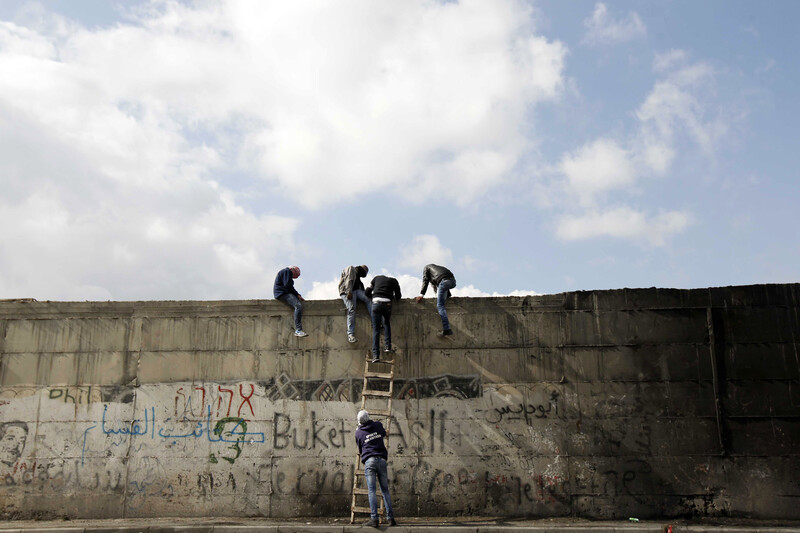The Electronic Intifada 3 September 2015

Palestinians climb a ladder to get over the Israeli-built wall separating the occupied West Bank village of Abu Dis from Jerusalem, 17 November 2014.
APA imagesUS President Barack Obama, in a recent interview with Jeffrey Goldberg in The Atlantic, reaffirmed his support and love for Israel because, as he claims, “it is a genuine democracy and you can express your opinions.”
He further expressed his commitment to protecting Israel as a “Jewish state” by ensuring a “Jewish majority.”
The US government’s support for the “Jewish state” has always been far more than rhetorical, backed by billions of dollars of military funding and consistent pro-Israel vetoes at the UN Security Council.
We are a group of US-based academics, representing diverse ethnic, racial and cultural backgrounds, as well as a range of national origins, who recently visited Palestine. We were able to gain firsthand exposure to what Obama described in the interview as Israel’s “Jewish democracy” and to what kinds of infrastructure our tax dollars help to support — walls, checkpoints and modern weaponry.
We had the privilege of traveling through part of the occupied Palestinian territories — the West Bank, including East Jerusalem — where we met with Palestinians.
Double standards
We feel compelled to share a few examples of what we witnessed during our visit with Palestinian scholars, policy makers, activists, artists and others working in the West Bank. We observed numerous double standards with regard to Palestinians’ rights that prompt us to question the claim that Israel is a genuine democracy.
We believe that our government’s assertions that Israel is a democracy obscures the conditions it imposes on the Palestinian people through the occupation and beyond with conditions that amount to apartheid under settler colonialism.
Our concerns began even before we arrived, as a search of the US State Department website for information about travel to Israel returned sobering results.
The US government warns travelers to back up their computers because Israeli border control officials can erase anything at will. This indeed happened to one of us upon leaving Tel Aviv to return to the US.
The site also warns travelers that their personal email or social media accounts may be searched, and so travelers “should have no expectation of privacy for any data stored on such devices or in their accounts.” Equipment may also be confiscated.
The State Department further acknowledges that US citizens who are Muslim and/or of Palestinian or other Arab descent may have considerable trouble entering or exiting through Israeli-controlled frontiers. And this too happened to one of us who had mobile phone contacts searched immediately on entering Tel Aviv.
Profiling
Concerns in entering and exiting pale in comparison to the restrictions placed on US citizens of Palestinian origin, along with all other Palestinians who hold identification documents from the occupied West Bank and Gaza.
Before traveling, most of us did not understand that for Palestinians under occupation, there are several types of identification and profiling and each comes with its own restrictions on mobility.
Palestinians from Jerusalem have identification cards they must carry in a blue booklet while those living in the rest of the occupied West Bank hold an ID card in a green booklet, issued to them from the Palestinian Authority with the permission of the Israeli government.
People possessing that identification generally cannot enter Jerusalem or present-day Israel without prior permission, even for a visa interview to attend an academic meeting in the US. Many people we met had only visited Jerusalem, home to many holy sites, once in their lives despite being mere minutes away by car.
In the rest of the West Bank, a US citizen of Palestinian origin who wants to live there long term has to obtain a visa that says West Bank only. They are not allowed to travel in and out of the West Bank and are subject to the same checkpoints as other Palestinians. They cannot leave the occupied territories as a US citizen, as the State Department warns on its website.
A Palestinian in the West Bank who holds US citizenship cannot simply catch a plane from Tel Aviv like any other US citizen simply because he or she is Palestinian and holds a Palestinian ID card. This fact is stamped into the US passport.
They are not allowed to enter the checkpoints into Jerusalem or any other checkpoints as other people with a US passport can. This restriction is not at all applied to the Jewish settlers who are growing in number — thousands of them US citizens who are choosing to live in the occupied West Bank inside illegal settlements financed in part by US tax-exempt organizations.
Academic freedom
As scholars, among the many disturbing things we witnessed was the limited academic freedom and freedom of speech imposed on Palestinians (and many Israelis, whose travel in the West Bank is restricted) by the Israeli government.
We learned that there is a prohibition on most books published in Syria, Iran and Lebanon even though Beirut is a central publishing hub of Arabic literary materials in the region. Regardless, banning books is, in our view, a profoundly anti-democratic act.
Israel’s wall that surrounds the West Bank including Jerusalem — and which snakes deep inside the West Bank in many locations — also functions to limit academic freedom.
One of the starkest examples is in Bethlehem, where the wall cuts through the city, making access to education at Bethlehem University very difficult for those who happen to be on the wrong side of the wall’s many twists and turns.
Additionally, the Abu Dis campus of Al-Quds University is completely surrounded by the wall, making travel to and from the campus incredibly arduous despite it being in Jerusalem.
An academic colleague described to us the difficulties she experiences getting to campus on a typical day. She must pass through roadblocks and endure searches and myriad forms of harassment by Israeli soldiers. In the West Bank, we were shocked to witness separate roads for Palestinians and Israelis based on the color of one’s license plate and identity card.
In theory, these roads exist for the protection of Israeli settlers living on settlements built in the West Bank illegally according to international law. In practice, these roads create an apartheid travel system where Palestinians encounter several checkpoints on a given day, some of which may be mobile, unpredictably placed “flying checkpoints.”
As our colleague explained to us, what used to be a very short trip between her village and the university now often takes more than an hour and a half and she is expected to cross through at least three checkpoints. She is often late to teach her classes and some days she is unable to make it to work or back home at all.
Her students are often arrested and jailed using the legal cover of administrative detention — detention without charge or trial for an indefinite amount of time — for their participation in any political activities, or simply for being in the wrong place at the wrong time. We heard that this process is intensified at exam periods.
This creates an extraordinarily stressful academic environment when on any given day Israeli soldiers might detain students and faculty who are simply traveling to class.
Impunity
We recognize every people’s desire to be secure — and Israel’s supporters will defend its policies and actions in the name of its national security. What we witnessed during our visit is that “security” was offered as a rationale for almost any troubling behavior or policy.
What we witnessed was a slow but deliberate expansion of Israel’s occupation, increased settlements, the taking over of agricultural land and the spread of industrial parks in the West Bank including substantial parts of East Jerusalem — all in the name of “security.”
The United States, as a settler colonial state with its own occupations, police violence, carceral injustice, de facto apartheid and its own brand of border brutality — certainly has its own failings as a democracy, failings we continue to address in our intellectual and political work.
We thus claim no moral high ground. But an ethnocracy is not a democracy; the State of Israel imposes violent domination of the Palestinian people through colonialism, occupation and apartheid — three prongs of brutal oppression that are the very antithesis of democracy.
As academics, watching attempts to stifle criticism of Israel — as in the case of our colleague, Professor Steven Salaita — and visiting the West Bank has prompted us to speak out publicly about Israel’s injustices. Doing so is imperative.
We implore President Obama to reconsider his rhetoric and policies — and budget appropriations — that support Israel with impunity.
Radhika Balakrishnan is professor of Women’s and Gender Studies at Rutgers University.
Karma R. Chávez is associate professor of Communication Arts at the University of Wisconsin, Madison.
Ira Dworkin is assistant professor of English at Texas A&M University.
Erica Caple James is associate professor of Anthropology at Massachusetts Institute of Technology.
J. Kēhaulani Kauanui is associate professor of American Studies and Anthropology at Wesleyan University.
Doug Kiel is assistant professor of American Studies at Williams College.
Barbara Lewis is associate professor of English at the University of Massachusetts, Boston.
Soraya Mekerta is director of the African Diaspora and the World Program, and associate professor of French and Francophone Studies at Spelman College.




Comments
Obama and Israel's democracy
Permalink Barbara Lyons replied on
Obama is not dumb. He know what Israel is and what Israel does. Our Empire does not care as long as we in the US remain "fat and rich." I will NEVER forgive the Zionist for making me ashamed of being Jewish. Over centuries despite persecution Jews have done wonderful things and fought for justice. All this is being erased in the public mind by the actions of Israel since it's founding. The diaspora made us stronger.
American Support of Apartheid
Permalink Margaret Y Jones replied on
It's a shameful thing that the very practices that the U.S. rejected in South Africa are being supported, to the tune of billions of dollars every single year, when they are practiced by Israelis against Palestinians. Many use the Bible to support the Israeli atrocities, but the supporters seem to forget one of the most basic teachings known as the Golden Rule, among many other more love-based scriptures. Indeed, even the commandments appear not to be sacred enough, for stealing and killing are both practiced quite commonly. We need to open our eyes and see what horrors we are endorsing.
check your facts
Permalink Whoyoukidding replied on
The US were one of if not the last to come out against South African apartheid and even then had to be dragged kicking and screaming to do the right thing.
DEAR ROBERT JAN SMITS (EU):
Permalink Peter Loeb replied on
The so-called "security wall" is not in any "internationally recognized boundaries"
of Israel at all. The wall, according to the ICC (of the UN) is illegal.
So are all settlements and buildings illegal. You shoul review your
international law, Mr. Smits.
(See article on EU in today's EI.)
----Peter Loeb, Boston, MA, USA
It is at least a year and a
Permalink ornella replied on
It is at least a year and a half, after the discontinuation of the "peace talks", that abumazen reassures Israel he will not allow a new intifada. For this serves the Palestinian police, the watchdog of the master. This what prescribe the security arrangements. The security of Israel